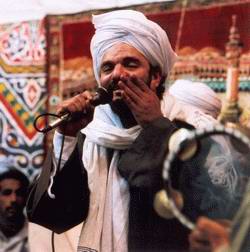Here another beautiful cassette from Egypt.
Sheikh Amin AL-DISHNAWI
Égypte

Sheikh Amin al-Dishnawi est aujourd'hui un personnage clé du petit monde des mûn-shiddin (chanteurs de l'inshad suffiya, le chant soufi de Haute-Égypte). Le mûnshid est le dernier grand personnage du monde populaire égyptien. Il est à la fois homme de foi, chanteur, poète, comédien, prophète et un peu magicien. On le traite avec déférence mais exigence, car, comme tout artiste en représentation, il doit constamment donner le meilleur de lui-même. Âgé seulement d'une trentaine d'années, Amin al-Dishnawi a déjà atteint une grande renommée proche de ses aînés, tels Ahmad al-Tuni ou Yasin al-Tuhami. Mais chacun de ces personnages possède son propre caractère. Au délire scénique d'Ahmad al-Tuni et au déchirement ténébreux de Yasin al-Tuhami, s'oppose la simplicité presque naïve du Sheikh Amin al-Dishnawi.
Amin al-Dishnawi possède l'apanage parfait de l'homme saint, il est affable et poli, (dans le sens arabe adab qui signifie bien se comporter avec son entourage). Le rayonnement de son regard fait mieux comprendre comment la recherche extatique n'est, peut-être, qu'une tentative à retrouver l'émerveillement de l'enfance.
Les magdoub (fous de Dieu ravis par l'extase) et les mudrib (aspirants à la présence de Dieu), aiment la sainteté que dégage Amin al-Dishnawi, cette faculté à révéler le divin qui facilitera l'état de transe, lors du dhikr, la danse rituelle soufie. Amin al-Dishnawi est censé posséder une très grande "baraka", celle qui peut rejaillir sur toute une assemblée en quête d'exceptionnel.
Car le mûnshid est un avant tout un transmetteur: c'est par son inspiration et son habilité à déclamer les grands textes poétiques, que l'auditoire obtiendra le sentiment de délivrance propre à ces cérémonies. La révélation, dans une société traditionnelle, reste le moteur fondamental de l'inspiration, à l'opposé de notre monde profane animé par l'idée de l'art comme émanation de la créativité humaine.
from:
http://www.africultures.com/php/?nav=personne&no=4893See also:
http://www.bolingo.org/audio/arab/munshidin/dishnawi.htm









